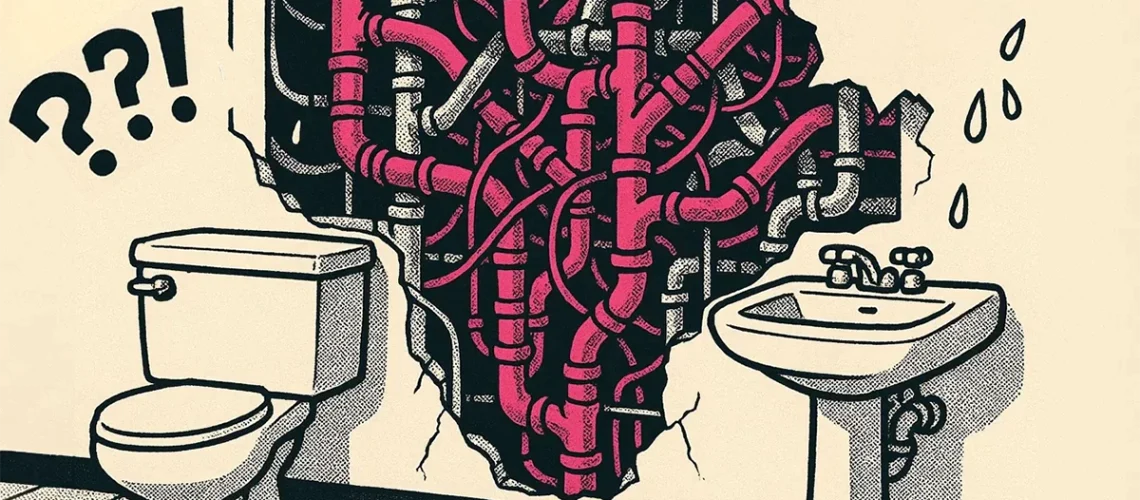Plumbing vents play a crucial role in maintaining the health and functionality of your plumbing system. While often overlooked, these vents are essential for proper drainage and air circulation within your pipes. In this guide, we’ll explore the purpose of plumbing venting systems, their benefits, and why vent pipes are needed for an efficient and safe plumbing setup.
Contents
Why Do You Need a Vent for Plumbing?
The primary purpose of plumbing vent pipes is to allow fresh air to enter your drainage system, which facilitates the smooth flow of water and waste. Without adequate ventilation, negative pressure can build up in the pipes, leading to slow drainage, unpleasant odors, and even harmful gases seeping into your living spaces.
Understanding Plumbing Vent Systems
A plumbing vent system consists of a network of pipes connected to your drainpipes, extending upwards and out through the roof. These vents maintain atmospheric pressure within the drainage system, ensuring that water flows freely and waste is removed efficiently.
- Why vent pipes are needed: Vent pipes allow gases to escape, preventing pressure imbalances that could disrupt the flow.
- How vent pipes affect plumbing: By balancing pressure, vent pipes enable water to drain smoothly and prevent backflow or clogging.
The Importance of Vent Pipes in Plumbing
1. Prevention of Drain Blockages
One of the critical benefits of plumbing vents is their ability to prevent blockages. When there is insufficient air pressure, water may not drain correctly, leading to clogs over time. Proper venting provides a continuous air source, minimizing the risk of buildup within pipes.
2. Protection from Harmful Gases
A venting system also keeps hazardous sewer gases out of your home. When wastewater flows through your pipes, it releases gases that need to escape. Without plumbing vents, these gases would eventually enter your home, posing health risks.
3. Enhanced Drainage Efficiency
By understanding plumbing vent systems, you can appreciate how they enhance the overall efficiency of drainage. Vents allow for consistent pressure levels, ensuring that wastewater flows freely through the pipes without interruption.
Key Facts About Venting Systems and Their Functions
To understand why proper plumbing venting matters, here are a few essential facts about the role of vent pipes:
- Air Circulation: Vent pipes allow air to circulate through the plumbing, helping waste and water move smoothly.
- Odor Control: Plumbing vents help prevent foul odors from escaping your drains and entering your home.
- Pressure Balance: They maintain balanced pressure in the pipes, which prevents suction issues that can cause slow drains.
Why You Need Plumbing Vents in Your Home
Proper venting is not only beneficial for a functional plumbing system but also a building code requirement in most areas. The importance of vent pipes in plumbing can’t be overstated, as they ensure safety, cleanliness, and efficiency in your home’s drainage.
Benefits of Plumbing Vents
Improved Longevity of Plumbing System
With consistent ventilation, your plumbing system endures less wear, reducing the likelihood of pipe corrosion or damage due to pressure fluctuations.
Reduced Maintenance Needs
Effective venting minimizes the frequency of clogs and backups, saving you time and money on maintenance. It’s a proactive measure that can keep your plumbing running smoothly for years.
Conclusion
The importance of vent pipes in plumbing extends far beyond simple drainage – they’re essential for maintaining air balance, odor control, and the overall longevity of your plumbing system. By understanding the role of plumbing vents, homeowners can ensure a safer, more efficient, and longer-lasting system that meets health and safety standards. Proper plumbing venting is truly an indispensable aspect of any well-functioning plumbing network.
FAQ
Vents allow air to enter the plumbing system, balancing pressure and enabling smooth drainage. Without vents, drains can become slow or even back up.
Vent pipes maintain balanced pressure, helping water flow efficiently and preventing clogs or backflow by allowing air into the drainage pipes.
Proper venting prevents sewer gases from entering your home, which protects indoor air quality and reduces health risks associated with exposure to these gases.
Without vents, drains can become slow, sewer gases can enter the home, and pressure imbalances can cause gurgling noises or even sewage backups.
Vent pipes are vital for a safe, functional plumbing system, preventing blockages, balancing pressure, and keeping sewer gases out of your home.




